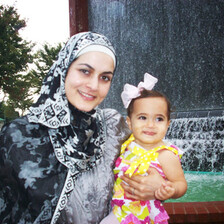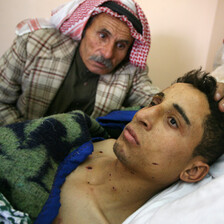Durham, United States 4 January 2009
My father and I made simultaneous back to back appearances on domestic CNN and CNN International last night. My father spoke calmly, eloquently, in the pitch dark of besieged Gaza, with only the the fire of Israeli bombs illuminating his world. “They are destroying everything that is beautiful and living,” he told the anchor.
His hands were trembling, he confessed, as my mother and he lay on the floor of their home, where they moved their mattress far away from the windows. Thunderous explosions ripped through the black sky all around them, lighting it up in enormous clouds of fire.
I call them every hour; sometimes every few minutes when I see renewed bombardment on my television. Sometimes he calls me for assurance:
“What’s going on? What’s going?” he repeats in a weary, hypnotic tone.
“It just felt like they bombed our street from the inside out. I can’t see anything. I don’t know what’s happening. What’s the news saying?” he asks frantically, desperate for any morsel of information that can make sense of the terror being wrought upon them.
“The Apaches are right above our house. Its complete darkness outside, complete darkness,” he goes on.
I ask if he got any sleep — I was up with him a good part of my night until dawn rose as the earth was being blasted apart around him.
“Two hours, better than nothing.” He said he went out for a quick breather, and took a picture of some children who went out for a few tense minutes to kick a ball around.
He passes the phone to my mother. She tries to make pleasant chit-chat, asking about when we will celebrate my daughter Noor’s birthday, though I already told her a few days ago we had a small party.
“Oh that’s right, that’s right. Yassine?” she says, addressing my husband.
“I don’t know what’s wrong with me. Its strange, strange. My body is literally trembling from the inside. From the inside. Why do you think that is? Its strange,” she rambles on.
I ask how they are doing on food supplies. She says she stood in line for one and a half hours for a parcel of bread yesterday.
My father last night tried to communicate a single message: We keep hearing that Israel is after Hamas, but we are the targets here; civilians are the targets here, not Hamas.
An entire refugee family in one fell swoop was killed this morning as they took cover in their home, which took a direct hit from Israeli shells. Their deaths do not make Israeli more secure. Their deaths will not stop rocket fire.
Six paramedics and a doctor were also killed as they tried to rescue wounded Palestinians in northern Gaza.
And now, the Associated Press reports that the Gaza phone network is on the brink of collapse. I do not know how much longer I will be able to communicate with my parents.
Israeli human rights groups have also just reported that 75 percent of Gaza is without electricity and the sewage system is on the brink of collapse. In addition, Gaza City, including al-Shifa Hospital, is entirely without electricity. They also say 20 percent of those killed have been children and women. They also note that over half a million residents cut off from water supply and that sewage is spilling into streets, with the risk of more flooding. In addition, no fuel has been permitted into Gaza since start of the military operation on 27 December.
Thirteen thousand Palestinians — many of them refugees from 1948 — are now internally displaced in Gaza, according to the United Nations. Refugees three times over.
Live Free or Die. The motto of the State of New Hampshire, probably one that few Americans are familiar with, has never rung truer. And how similar it is to the feeling of ordinary Palestinians in the Gaza Strip now, trying merely to survive day to day, longing for a life free of Israeli occupation and terror.
Laila El-Haddad is a Palestinian freelance journalist, photographer, and blogger (http://a-mother-from-gaza.blogspot.com/) who divides her time between Gaza and the United States.
Related Links





